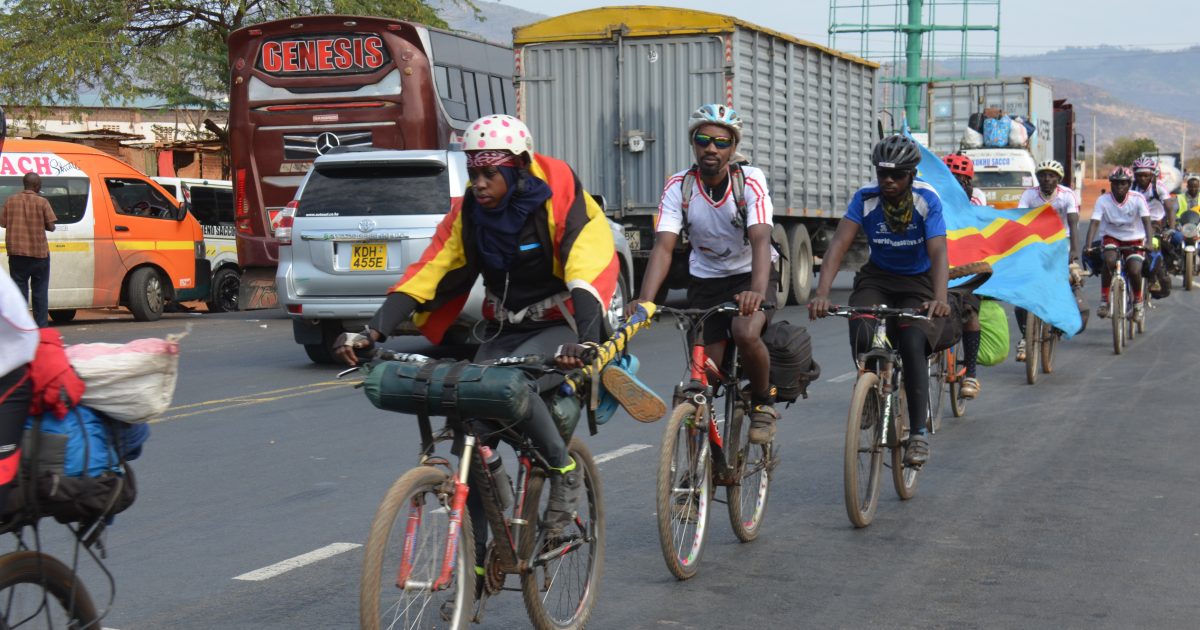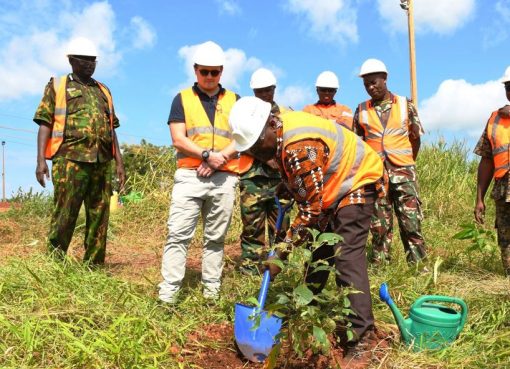It is late afternoon. To a casual eye at Manga shopping centre on the edge of Tsavo National Park along the Nairobi-Mombasa Highway, the endless stretch of the highway looks like a black ribbon extending to the distant horizon.
Over the road, a thin layer of mirage rises over the surface as rays of the afternoon sun fall over the heated surface. The highway is busy. Small cars zoom past at dizzying speed. Loaded trailers rumble over the bumpy surface. Oil tankers thunder past the centre, leaving the air tingling with the echo of their clatter.
From the heart of the mirage, a group of brightly-dressed cyclists emerges. They form a beeline with the lead cyclist keeping the rest of his team confined to the narrowed left shoulder of the hazardous highway.
They are dwarfed and deafened by the trailers rambling past them but they remain rigidly focused on the narrow section where their bicycles are riding over.
Proudly hoisted at the rear seat of each bicycle is a flag; Kenya, Uganda, Burundi, Rwanda and Congo. The flags flap elegantly under the nudge of invisible Tsavo breeze; swaying like proud banners of African patriotism.
A few truckers honk at the riders in celebratory salute. Without looking up, the cyclists give thumbs-up signs but maintain their strict formation.
“These are riders of the East African Community. We are talking to people we meet about food security and environmental conservation,” says Mr George Ochieng, a Kenya rider.
Ochieng is one of the 19 riders from EAC member states participating in the 2023 Great Africa Cycling Safari (GACS). This annual transnational bicycle-riding event brings together EAC cyclists to spur deeper integration in sports, strengthen ties amongst the countries and showcase cultural diversity amongst urban and rural communities in the member states.
This year, GACS is covering a staggering 6,000 kilometers within 55-days. During this period, the team will go across Kenya, Uganda, Tanzania, Rwanda and Burundi. However, the riders will miss South Sudan and Democratic Republic of Congo due to the security challenges in those countries.
Ochieng terms the riders as trans-country ambassadors who are engaging communities on issues of climate change, environmental conservation and food security; the three factors affect all citizens within the EAC bloc.
The 2023 route is expected to be punishing to the riders. From grueling rides through city traffic gridlocks, the cyclists will contend with dilapidated dry-weather roads in drought-stricken countryside, put up with sweltering heat through vast open spaces and ride through bushes and national parks.
At night, the riders will sleep in tiny tents under the open skies before pushing on with their journey at dawn.
Through the journey, the riders have become advocates of grassroots conservation and EAC integration. At every stop, they are interacting with excited villagers. They take photos, share their meals and drinks and exchange contacts as the most basic form of spreading the spirit of oneness amongst the EAC.
Mr Daniella Hamuli, a 20-year-old Congolese rider, terms the journey as an eye-opener to similarities shared by communities in the EAC. He says the passion to spur positive change amongst communities and the thrill of adventurism shared by the team is a flame that should never be left to die.
“We are all one. I am making friends wherever I go. People here are like my people back at home. We are a family,” he says.
He admits facing challenges including having multiple punctures and avoiding careless driving by rogue drivers along the highway.
The event kicked off in Jinja, Uganda. At the start, there were 50 riders but the number has whittled down sharply; a testament to tough conditions the riders are confronting. By the time the team arrived to establish a Climate Change Hub in Voi sub-county on Saturday, the number was at 19.
“The roads are terrible. There are wires that have given us punctures. It is a difficult task but it’s worth it,” says Ochieng.

Their hardy bicycles are their lifeline. They carry bags with food, water, drugs, clothes and tool kit. Other bikes are fitted with professional Go-Pro cameras to document the whole journey which is set to end at Kampala.
Ms Nakabute Shamal, 26, a Ugandan cyclist is one of the three lady cyclists in the GACS team. The others are from Kenya and Tanzania. This is her second GACS event. She wants to inspire young girls into participating in such events and promoting gender equality and inclusion in fields touted as male-dominated.
“Young girls are capable too. They should pursue their passions and dreams without fear of being looked down upon,” says Shamal, who has been riding since the age of 5, adding that her parents have been supportive of her dreams and have never held her back.
“We speak daily and I share with them the progress of my ride. They encourage me a lot,” she says.
One the most notable inclusion in this team is Bella; an 8-month Belgian Malinois pet dog. She and Bill Munga, a 22-years Kenyan rider, are inseparable. During this trip, Bella is riding like a princess. She curls up to sleep in a crate lined with a soft rubber at the rear seat while Munga rides at the front. At night, they curl up in the same tent and share meals too.
“She is my best friend and we decided to go together. As you can see, she is totally thrilled to come along and see new places,” says Munga with a huge grin.
He says that Bella has become some sort of team mascot and very much loved by the team. When tired, she comes down to trot along the cyclists. For her safety, she has been trained to keep off the roads and stick to pedestrian lanes.
By Wagema Mwangi




